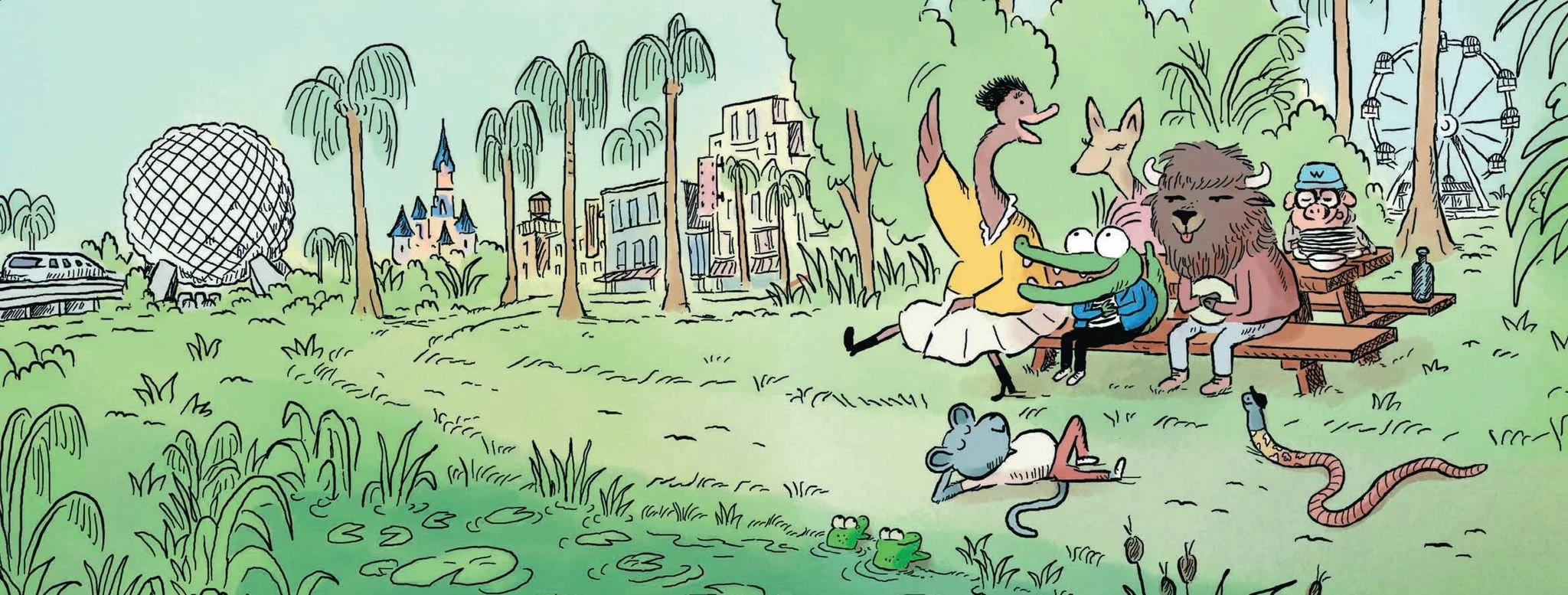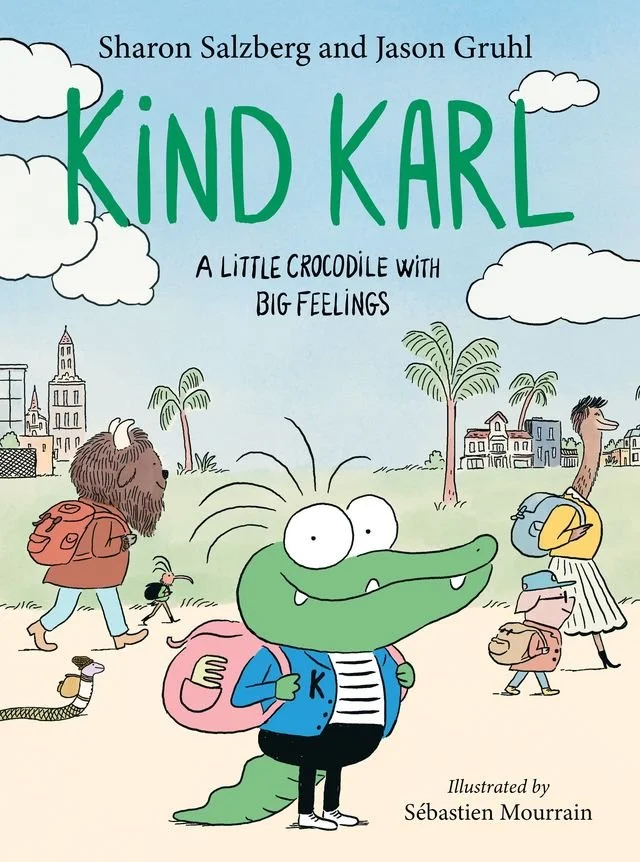Meet Kind Karl: The Star of Sharon Salzberg’s Insightful New Children’s Book
Karl is a young crocodile with a big heart and a temper that sometimes gets the best of him. He loves cardigans and crepes, and he’s learning something new about himself: when his feelings get too big, he snaps—at classmates, friends, even himself. Karl doesn’t want to be unkind but snapping feels automatic, it makes sense, he’s a crocodile.
After a tough day at school, Karl notices something: his thoughts aren’t always true. When he watches them drift away like clouds and tries small, kind things to help himself feel better—like jumping on his trampoline or coloring with all the crayons—he feels a little more at ease. He wonders, “If kindness helps me, could it help other people too?”
Karl begins testing it out—not because someone else was kind first, but because he sees how much it helps when he’s kind to himself. And when he does, something unexpected happens. Kindness doesn’t just change how Karl feels, it changes how other people relate to him.
Karl isn’t perfect, and he doesn’t have to be. He’s learning—like many of us—to pause, question what’s true, and choose kindness when he can. And that’s more than enough to start changing things.
What Kind Karl Teaches Us About Caring for Ourselves (and Each Other)
I recently had the pleasure of joining my longtime friend and mentor, Sharon Salzberg, on her podcast The Metta Hour. We spoke about her new children’s book, Kind Karl—the story of a young crocodile who discovers that caring for his emotions and acting with kindness can change not only how he feels, but the world around him.
Sharon was a major influence at a formative time in my life. When I was a young mom navigating a serious family health crisis, I leaned on her Lovingkindness teachings—listening to her guided meditations on cassette tapes while folding laundry or to ground myself when I was scared. Those early practices helped me stay steady and kinder with myself, and they shaped how I began sharing mindfulness with children and families.
Like Karl, the kids and families in my classes learn how to “send friendly wishes” to themselves and others—while walking, sitting, lying down, or imagining a hug. I like that phrase because friendly feels warm and familiar, the kind of care you’d offer a good friend. And wishes keeps the practice open-ended. We’re not trying to force anything to be true—we’re opening to what's already inside us.
Silently saying “May you be happy” isn’t a magic spell. It’s a simple reminder that we can choose care, even when things are hard. And that choice taps into a natural love and warmth we all share. Sometimes, just a little bit of that can go a long way.
That’s what I especially like about Kind Karl. It shows that when we learn to work with our big feelings, things don’t just feel different on the inside—they change on the outside too. When Karl starts looking at his vulnerability with care and curiosity, he begins seeing others that way too. Not because they’ve earned it, but because kindness has become part of how he moves through the world. And when he does, the world softens right back.
In the spirit of Karl—and all of us learning to be gentle with ourselves—here are a few friendly wishes, just for you:
May you be safe.
May you be healthy.
May you be happy.
May you live with ease.
With kindness,
Susan
A Conversation with Sharon Salzberg & Three Kind Karl Inspired Activities
Karl’s story opens up a whole world of conversations about kindness—how we practice it with ourselves, with others, even when we’re having a tough day. If that sounds like something you'd enjoy diving into, I hope you’ll tune into my recent conversation with Sharon Salzberg on The Metta Hour podcast. We talked about Karl, the power of small acts of kindness, and how these ideas can ripple out into our daily lives.
And if you’d like to explore these themes with the children in your life, I’ve put together three simple, Karl-inspired activities. Each one helps them pause, notice what they’re feeling, and bring a little more kindness into their world—whether they’re at home, in school, or anywhere they gather.
Snap & Pause
Karl snaps when his emotions get too big. The next time a child feels that snap rising—at the kitchen table, on the playground, or during class—try this:
Encourage them to place a hand over their heart and pause for a moment.
Ask: “What’s one small thing you could do right now to be kind to yourself?”
An idea: Draw a “Snap Pause Button” and hang it nearby as a reminder.
Kindness Cloud Game
Just like Karl imagines his sticky thoughts floating away, children can practice noticing, letting go, and reframing their thoughts:
Draw 3–5 storm clouds and write or doodle a “bothersome” thought in each one.
Imagine a breeze carrying them away.
Replace them with “sunbeam thoughts” like: “I can try again,” or “I’m learning.”
Works well as an individual activity or a group art project.
Karl’s Kindness Cardigan
Karl’s cozy cardigan comes to represent warmth and care. Here’s a way to bring that spirit into your space:
Create a poster cardigan and hang it on a wall, the back of a door, or even your refrigerator.
Cut out colorful paper patches, or put colorful buttons or stickers in a jar, and leave them next to the poster.
Each time someone shows or receives an act of kindness, add a patch.
Watch the cardigan fill up over time—growing kindness one small act at a time.


